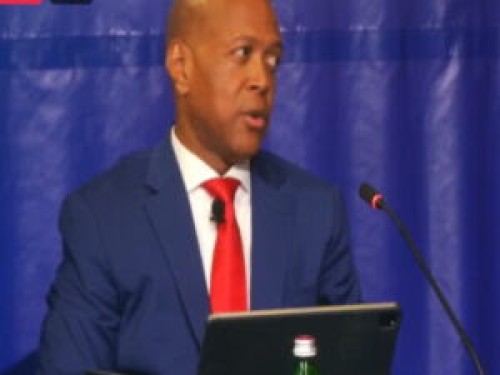KINGSTON, Jamaica - Caribbean Community (CARICOM) Central Bank governors are giving support to a pilot program for the CARICOM Payment and Settlements System (CAPSS).
 Governor of the Central Bank of Barbados, Dr. Kevin Greenidge (File Photo)The regional bankers whose two-day meeting ended here last weekend, say they are “resolved to advance the work on intraregional payments and in that regard have given their support to the CAPSS that regional governments say will contribute to the achievement of the full integration of the national markets of CARICOM member states into a single, unified and open market area.
Governor of the Central Bank of Barbados, Dr. Kevin Greenidge (File Photo)The regional bankers whose two-day meeting ended here last weekend, say they are “resolved to advance the work on intraregional payments and in that regard have given their support to the CAPSS that regional governments say will contribute to the achievement of the full integration of the national markets of CARICOM member states into a single, unified and open market area.
The governors said that they will also support CAPSS leveraging the technology of the Pan-African Payments & Settlement System (PAPSS) of the African ExportImport Bank.
Last week, as he addressed the opening of the AfriCaribbean Trade and Investment Forum (ACTIF23) in Guyana, Afreximbank President and chairman of the Board of Directors, Professor Benedict O. Oramah, said a payments and settlement programme with an African bank has been selected to run a pilot programme for CARICOM central banks, adding “we hope that very soon they payments systems for Africa and CARICOM will be integrated…”
Oramah recalled that he had addressed regional leaders earlier this year on assisting the region in establishing a CARICOM Import-Export bank of which his bank would be a shareholder “if invited to”.
Governor of the Central Bank of Barbados, Dr. Kevin Greenidge, will assume the Chair of the Committee of Central Bank Governors in 2024.
In a statement following the 61st CARICOM Committee of Central Bank Governors, the bankers said they reviewed the regional and global financial markets, macroeconomic environment, regional economic outlook and monetary policy.
“The regional economic performance assessment identified the key risks to macro-economic stability in regional economies during the post-pandemic period, including high imported inflation, geopolitical developments and climate vulnerability. It concluded that the region has generally recovered from the pandemic with a return to growth and inflation that is trending downward, while the banking system remained sound.”
The regional central bank governors received and endorsed a proposal for the establishment of a Regional Central Bank Group of Reserves Managers, which will meet virtually and share experiences and approaches in the management of national reserves.
The governors also agreed to improve communications among the regional central banks with Jamaica scheduled to host the next meeting of the communications network of CARICOM central banks.
The meeting here also discussed CARICOM country experiences in implementing and using polymer banknotes and identified successes, challenges and other implications associated with the introduction.
The statement said that the governors noted that the introduction in Barbados, the Eastern Caribbean, Jamaica and Trinidad and Tobago, of the banknotes which utilise the polymer substrate achieved stated objectives, and they agreed to continue sharing experiences at the operational level
Among the reports discussed at the meeting were updates on continued vigilance in anti-money laundering surveillance and compliance, as well as further harmonisation of bank supervisory practices through cooperation and training.
“Many regional central banks have implemented elements of the Basel II framework, while some are also implementing the Basel III framework. Cybersecurity remains a major area of focus for regional central banks, which have increased collaboration, information sharing and training in areas including cloud policy frameworks and cloud adoption strategy, anti-phishing measures, and the development of a security framework for artificial intelligence solutions,” the statement said.
It said that several technical initiatives of the Committee of Central Bank Governors were considered and it was noted that the regional technology risk management framework has been updated to include cyber resilience principles and a cyber incident response and recovery function.
Work is continuing on the development of a regulatory framework on climate risk and green financing.
The meeting also reviewed the Caribbean central banks’ Research Agenda 2023-2025 and agreed that significant progress has been advanced on the workstream focusing on climate change and climate-related risks, while acceleration was encouraged in the pace of research work on a Regional Macro-Financial Policy Framework and Future Paths to Regional Resilience.


